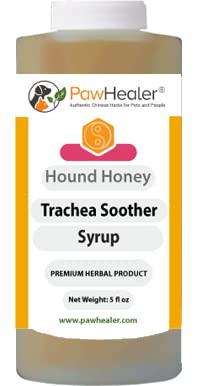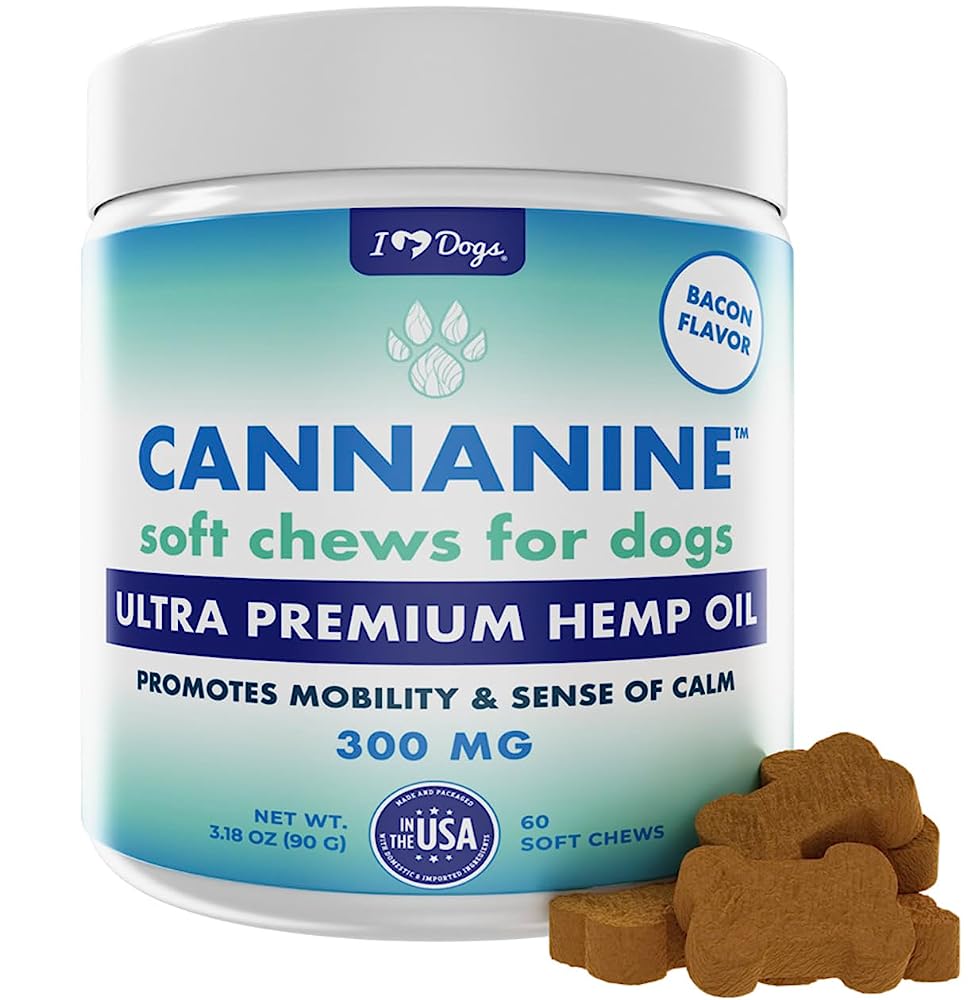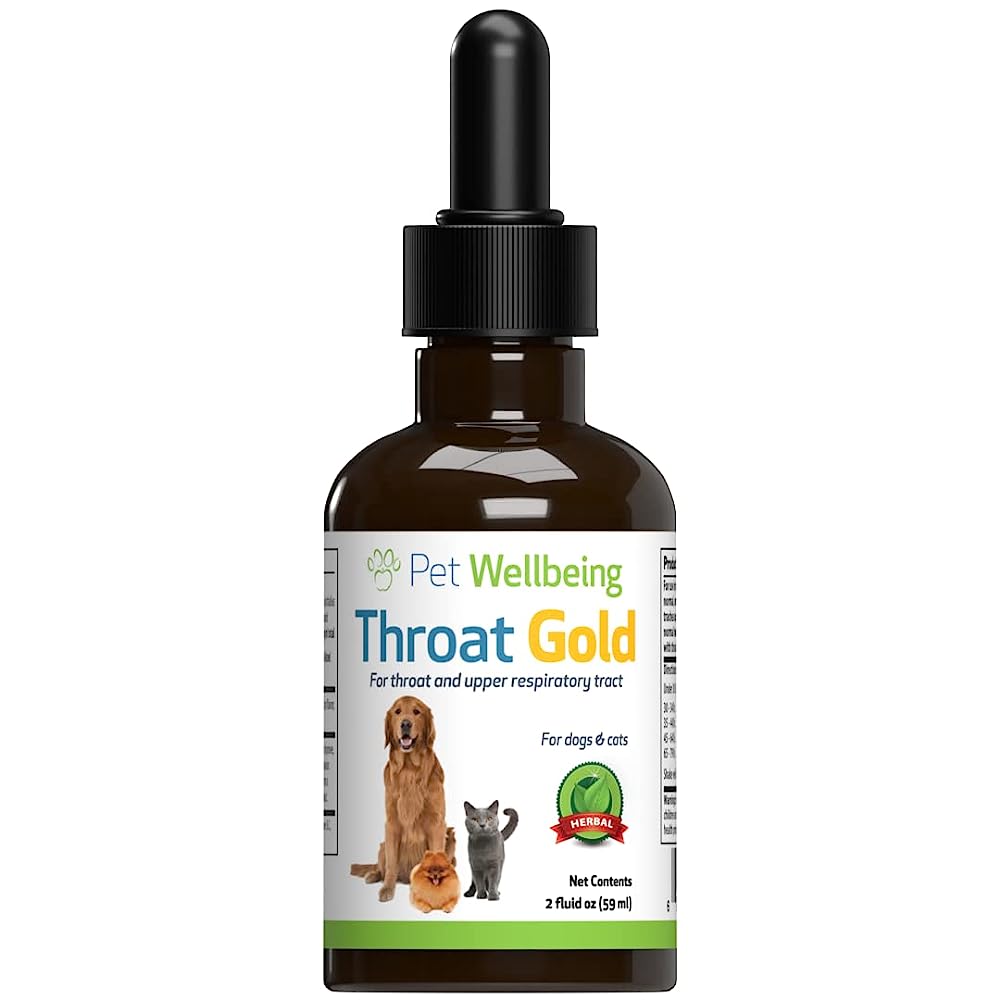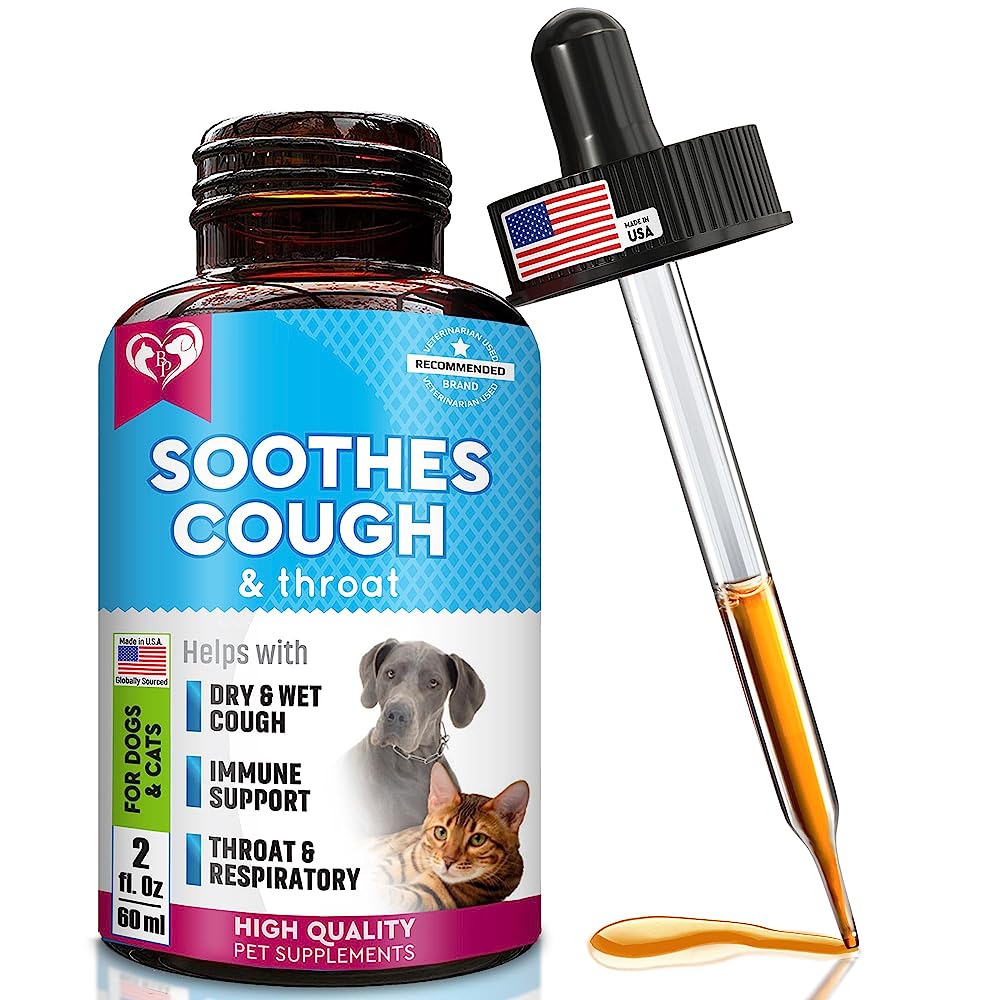iHeartDogs is reader supported. Some of the links below may be paid affiliate links, where we receive a small commission on a product at no additional cost to you.
For dogs living with a collapsed trachea, their quality of life can be significantly impacted, with symptoms ranging from a persistent cough to breathing difficulties. This common condition in small breeds can be managed effectively with a combination of lifestyle modifications, medical treatments, and dietary supplements. Specifically, certain supplements can help strengthen the tracheal cartilage and reduce inflammation, providing considerable relief. This article will explore the best supplements available for dogs with a collapsed trachea, aimed at enhancing their comfort and well-being.
#1 – PawHealer Hound Honey: Trachea Soother Syrup – 150 ml (5 fl oz) – Natural Herbal Remedy for Symptoms of Collapsed Trachea – Tastes Good – Easy to Administer…
PawHealer Hound Honey: Trachea Soother Syrup is a natural herbal remedy designed to alleviate symptoms of a collapsed trachea in dogs. With a palatable taste and easy administration, this syrup aims to provide relief for dogs experiencing honking-type cough, wheezing sounds, gagging/hacking cough, and signs of heat such as excessive thirst, panting, and seeking cool places. It offers a convenient solution for pet owners looking to soothe their dogs’ tracheal discomfort.

#2 – iHeartDogs Hemp Calming Chews for Dogs – Dog Anxiety Relief Bites with Hemp – Bacon Flavored Dog Calming Treats for Anxiety and Stress
iHeartDogs Hemp Calming Chews for Dogs are bacon-flavored soft chews that are designed to help alleviate anxiety and stress in dogs. These treats are not only tasty for dogs, making them think they’re receiving a treat, but they also aim to promote a sense of calmness and natural joint mobility. The product has been third-party tested and approved by the Clean Label Project.

#3 – Pet Wellbeing Throat Gold for Dogs – Vet-Formulated – Soothes Throat Discomfort, Hoarseness, Leash Strain, Occasional Cough in Dogs – Natural Herbal Supplement 2 oz (59 ml)
Pet Wellbeing Throat Gold is a 2 oz (59 ml) natural herbal supplement for dogs that is designed to soothe throat discomfort, hoarseness, leash strain, and occasional coughing. It is formulated with demulcent herbs like Slippery Elm and Mullein leaf that have mucilage properties to settle coughs and sore throats. Additionally, it supports the immune response in the upper respiratory tract and provides comforting relief for throat irritation. Developed by holistic veterinarians, this product is made in the USA and comes with a money-back guarantee. Trusted since 2001, it is made with high-quality ingredients and tested for purity.


#4 – Kennel Cough Treatment & Natural Infection Medicine for Dogs & Cats – Respiratory & Cold Cough Relief – Collapse Trachea & Cat Asthma Support – Made in USA
This Kennel Cough Treatment and Natural Infection Medicine is a pet remedy that aims to provide respiratory relief and boost immunity for dogs and cats. It claims to effectively relieve coughing and wheezing with natural herbal ingredients while also soothing the throat and calming the respiratory tract. The product is said to be safe and suitable for pets of all ages and breeds, with easy dosing instructions.

What Supplements Can Help a Dog with a Collapsed Trachea?
In managing a collapsed trachea in dogs, a combination of lifestyle modifications, medical treatments, and dietary supplements can be used. While a vet should always be consulted before starting any new supplement regimen, the following supplements may potentially aid in providing relief:
- Glucosamine and Chondroitin: These are commonly used for arthritic conditions in dogs due to their potential to support cartilage health. In the case of a collapsed trachea, they may help by strengthening the tracheal cartilage.
- Omega-3 Fatty Acids: Omega-3 fatty acids, especially those derived from fish oil, can help reduce inflammation, which can be beneficial for dogs with collapsed trachea.
- Antioxidants: Vitamins C and E are powerful antioxidants that may aid in reducing inflammation and protecting the body’s cells from damage.
- Probiotics: While they do not directly address the tracheal issue, probiotics can support overall health and boost the immune system, which can be important in managing the condition.
- Cough Suppressants: While technically not a supplement, natural cough suppressants like honey or certain herbs can also provide some relief from the symptoms associated with a collapsed trachea.
It’s important to remember that while supplements can help manage the symptoms of a collapsed trachea, they are not a cure for the condition. Always consult with your vet to establish the most effective and safe treatment plan for your pet’s specific needs and health status.
Frequently Asked Questions About Supplements for a Dog with Collapsed Trachea
- What is a collapsed trachea in dogs? A collapsed trachea is a condition often seen in small dog breeds, where the trachea or windpipe weakens and collapses, leading to breathing difficulties, coughing, and other respiratory symptoms.
- Can supplements cure a collapsed trachea in dogs? No, supplements cannot cure a collapsed trachea, which is a chronic and progressive condition. However, certain supplements can help manage the symptoms and improve the dog’s quality of life by supporting cartilage health and reducing inflammation.
- What supplements can help a dog with a collapsed trachea? Supplements that can potentially help include glucosamine and chondroitin to support cartilage health, omega-3 fatty acids to reduce inflammation, antioxidants like vitamins C and E, and probiotics for overall health support.
- How do I know which supplement is best for my dog? Always consult with your vet before starting any new supplement. They can assess your dog’s condition and recommend the most suitable and safe supplement.
- Are there side effects to these supplements? Like any dietary supplement, potential side effects depend on the supplement itself and the individual dog. Some dogs may experience mild gastrointestinal upset. Always start with a low dose and monitor your dog’s reaction.
- How long will it take to see improvements in my dog after starting supplements? The time to see improvements can vary widely, but generally, you might start noticing changes in a few weeks. However, supplements should be used consistently for the best results.
- Can my dog take these supplements alongside other treatments? Yes, typically these supplements can be given alongside other treatments. However, you should always discuss this with your vet to avoid potential interactions.
- Can I give my dog human supplements? Not all human supplements are safe for dogs, and the dosage may differ. Always consult your vet before giving your dog any supplements intended for humans.
- Where can I buy these supplements? Dog-specific supplements can be purchased from pet supply stores, online, or sometimes directly from your vet’s office.
- What else can I do to help my dog with a collapsed trachea? Alongside supplements, maintaining a healthy weight, using a harness instead of a collar, avoiding exposure to irritants like smoke and dust, and managing stress can all help manage a collapsed trachea in dogs. Always follow your vet’s advice for the best management plan.
Related: The 4 Best Supplements for Puppies (+1 to Avoid)
Conclusion: Best Collapsed Trachea Supplements for Dogs
Managing a collapsed trachea in dogs requires a comprehensive approach, and dietary supplements can play an integral role in this regimen. By choosing high-quality, vet-recommended supplements, you can aid in strengthening your dog’s tracheal cartilage, reducing inflammation, and ultimately improving its quality of life. However, these supplements should always be used as part of a broader treatment plan, overseen by a professional vet. It’s crucial to remember that while supplements can provide much-needed relief, they should never replace veterinary care. Always consult your vet before adding any new supplement to your dog’s diet to ensure it’s a safe and suitable choice.
iHeartDogs is reader supported. Some of the links below may be paid affiliate links, where we receive a small commission on a product at no additional cost to you.
- Best Joint Supplement for Dogs
- Best CBD Gummies for Dogs
- Goat's Milk for Dogs
- Skin & Coat Supplements for Dogs
- Weight Gain Supplements for Dogs
- Muscle Building Supplements for Dogs
- Heart Supplements for Dogs
- Multivitamins for Dogs
- Pill Pockets for Dogs
- Digestive Enzymes for Dogs
- Turmeric for Dogs
- Liver Supplements for Dogs
- Tear Stain Supplement for Dogs
- Breath Fresheners for Dogs
- Kidney, Urinary, & Bladder Supplements for Dogs
- Stool Eating Deterrent for Dogs
- Eye Supplements for Dogs
- Melatonin for Dogs
- Apple Cider Vinegar for Dogs
- Green Lipped Mussels for Dogs
- L Theanine for Dogs
- Chondroitin Supplements for Dogs
- MSM for Dogs
- Valerian Root for Dogs
- Chamomile for Dogs
- Boswellia for Dogs
- L Tryptophan for Dogs
- Yucca for Dogs
- Licorice Root for Dogs
- Bromelain for Dogs
- Papain for Dogs
- Devil's Claw for Dogs
- Quercetin for Dogs
- Hemp gummy for dogs
- Best Hemp Dog Treats
- Best Hemp Oil for Dogs
- Best Calming Treats, Chews, & Supplements for Dogs
- Best Bone Broth for Dogs
- Best Fish Oil for Dogs
- Best Probiotics for Dogs
- Best Hip Dysplasia Supplements for Dogs
- Best Colostrum for Dogs
- Best Quercetin for Dogs
- Best Greens for Dogs Supplements
- Best Vitamin C Supplements for Dogs
- Best Probiotic for Dog with Allergies
- Best Taurine Supplements for Dogs
- Best Dog Food Toppers
- Best Anal Gland Supplement for Dogs
- Best Dog Probiotic Powder
- Best CoQ10 Supplement for Dogs
- Best Liquid Glucosamine for Dogs
- Best Wrinkle Creams, Balms, and Wipes for Dogs
- Best Puppy Calming Treats
- Best Colloidal Silver for Dogs
- Best Adaptogen Supplements for Dogs
- Best Cognitive Supplements for Dogs
- Best Bee Pollen for Dogs
- Best Vitamin A Supplements for Dogs
- Best Vitamin E Supplements for
- Best Liquid Glucosamine Supplements for Dogs
- Best SAM-e Supplements for Dogs
- Best Hyaluronic Acid Supplements for Dogs
- Best Apple Cider Vinegar Supplements for Dogs
- Best Diarrhea Medicine for Dogs
- Best Milk Thistle for Dogs
- Best Turkey Tail Mushroom Supplements for Dogs
- Best Astaxanthin Supplements for Dogs
- Best Lutein Supplements for Dogs
- Best Electrolyte Supplements for Dogs
- Best Coconut Oil for Dogs
- Best Prenatal Vitamins for Dogs
- Best Puppy Milk Replacements
- Best Iron Supplements for Dogs
- Best Dewormer Products for Dogs
- Best Mange Medications for Dogs
- Best Cough Relief Products for Dogs
- Best Sinus Relief Products for Dogs
- Best Collapsed Trachea Supplements for Dogs
- Best Fireworks Anxiety Relief Products for Dogs
- Best Thunderstorm Anxiety Relief Products for Dogs
- Best Travel Anxiety Relief Product for Dogs
- Best Supplements for a Dog with a Torn ACL
- Best Supplements for a Dog with Patellar Luxation
- Best Supplements for a Dog with Intervertebral Disc Disease
- Best Zinc Supplements for Dogs
- Best Biotin Supplements for Dogs
- Best Tart Cherry Supplements for Dogs
- Best Resveratrol Supplements for Dogs
- Best Ginkgo Biloba Supplements for Dogs
- Best Ashwagandha Supplements for Dogs
- Best Supplements for Dogs with Cushing's Disease
- Best Adrenal Supplements for Dogs
- Best NAD+ Supplements for Dogs
- Best NMN Supplements for Dogs
- Best Supplements for Dogs with Dementia
- Best Supplements for Dogs with CCD(Canine Cognitive Dysfunction)
- Best Fiber Supplements for Dogs
- Best Spirulina for Dogs
- Best Hairball Remedies for Dogs
- Best Eye Drops for Dogs with Allergies
- Best Magnesium Supplements for Dogs
- Best Brushes for Double-Coated Dogs
- Best Dandelion Root Supplements for Dogs
- Best Probiotic for Dogs with Yeast Infections
- Best Flaxseed Oil for Dogs
- Best Chamomile Supplements for Dogs
- Best Lavender Supplements. Treats & Sprays for Dogs
- Best Collagen Supplements for Dogs
- Best Kelp Supplements for Dogs
- Best Activated Charcoal for Dogs
- Best Slippery Elm Supplements for Dogs
- Best Supplements for Dogs with Seizures & Epilepsy
- Best Antioxidant Supplements for Dogs
- Best Ubiquinol Supplements for Dogs
- Best Hormone & Glandular Supplements for Dogs
- Best Thyroid Supplements for Dogs
- Best Iodine Supplements for Dogs
- Best Dog Shedding Supplements for Dogs
- Best Detox Supplements for Dogs
- Best Postbiotics for Dogs
- Best Aspirin Products for Dogs
- Best Dog Anti-Nausea Products
- Best Dog Mouthwashes
- Best Camelina Oils for Dogs
- Best Hemp Seed Oils for Dogs
- Best Natural Anti-Inflammatories for Dogs
- Best Cancer Supplements for Dogs
- Best Sardine & Anchovy Oils for Dogs
- Best Fatty Acid Supplements for Dogs
- Best Chia Seed Supplements & Treats for Dogs
- Best Olive Oils for Dogs
- Best Amino Acid Supplements for Dogs
- Best Moringa Supplements for Dogs
- Best Echinacea Supplements for Dogs
- Best Cranberry Supplements for Dogs
- Best D-Mannose Supplements for Dogs
- Best Nettle Leaf Supplements for Dogs
- Best Marshmallow Root Supplements for Dogs
- Best Astragalus Supplements for Dogs
- Best Pumpkin Seed Supplement for Dogs
- Best Supplements for a Dog Wetting The Bed
- Best Blueberry Supplement for Dogs
- Best Bromelain Supplements for Dogs
- Best Yucca Supplements for Dogs
- Best Ginger Supplements for Dogs
- Best Rosehip Supplements for Dogs
- Best Allergy Medicines for Dogs
- Best Reishi Mushroom Supplement for Dogs
- Best Maitake Mushroom Supplement for Dogs
- Best Chaga Mushroom Supplement for Dogs
- Best Shiitake Mushroom Supplement for Dogs
- Best Cordyceps Mushroom Supplement for Dogs
- Best Lion's Maine Supplement for Dogs
- Have question? - Ask in our Dog Health Forum
 Toledo, United States.
Toledo, United States.